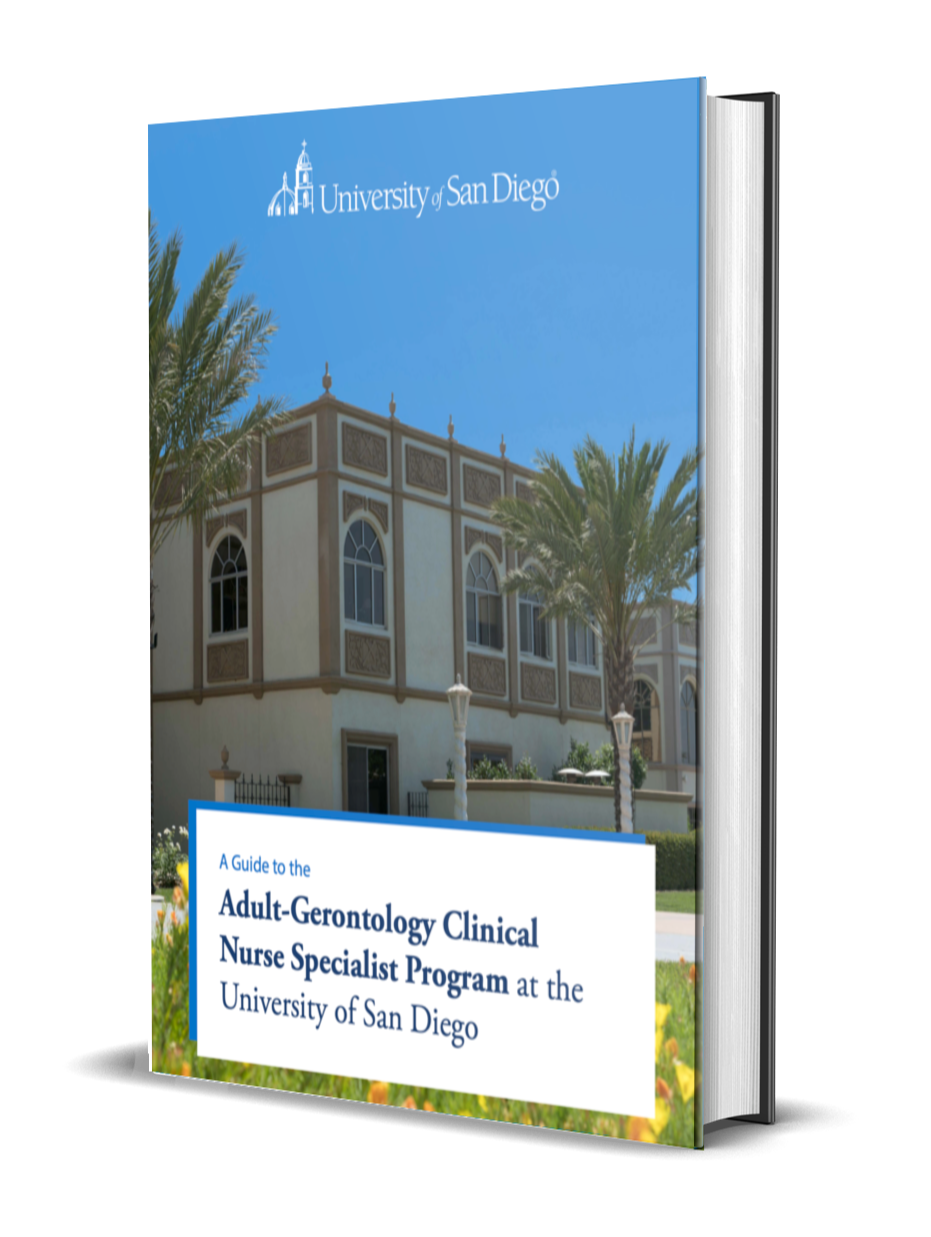
Discover the Benefits of a Nursing Degree From USD
The information in this blog post is for informational purposes only and is not intended to replace medical, financial, or professional advice.
Nursing is a rewarding profession. However, some nurses are now looking to unconventional nursing jobs to take a break from the physical and emotional demands of providing hands-on patient care. Shifts are long, and you can be on your feet for hours. You’re expected to perform clinically despite high-stress levels, often for multiple cases, all while managing patient and family needs.
On top of this, COVID-19 has exacerbated a situation that’s already tenuous and increased burnout and compassion fatigue for some nurses. Providing quality care requires a nurse to be present and invested. When you love what you do, you do it well. But if you’re no longer feeling passionate about providing care at the bedside, there are plenty of alternative careers for nurses to choose from.
Non-bedside nursing jobs
Feeling burned out by direct patient care? Getting away from bedside nursing might be the best way to stave off compassion fatigue and reignite your passion for nursing. These non-bedside nursing jobs could be the right fit for you:
Nurse Administrator
A Nurse Administrator is a nurse leader responsible for managing staff, patients, and facilities through the implementation of policies written by the nurse administrator or more senior staff. Nurse administrators are not usually directly involved in patient care, but are instead responsible for staff scheduling, managing budgets, supervising nurses, writing reports, and ensuring a high standard of patient care. Nurse administrators work in hospitals, long-term care facilities, and clinics.
Nurse Case Manager
Nurse case managers provide support and care coordination for patients with complex medical needs. Typically, these nurses work in hospitals and other healthcare facilities to assess patients' needs, develop treatment plans, and coordinate patient care with outside providers. Nurse case managers may also supervise clinical staff such as nursing assistants or home health aides. Overall, they serve as advocates for their patients while working to ensure that they get the best possible medical treatment.
Director of Nursing/Chief Nursing Officer
Perhaps the epitome of leading and managing in nursing is a Director of Nursing (DON) or Chief Nursing Officer (CNO): a nursing leader who is responsible for the overall nursing care provided in a hospital or other healthcare organization. They work with other members of the executive team to ensure that patient care is delivered in a safe, efficient manner. Typical day-to-day duties include evaluating nursing staff, developing nursing policies and procedures, and overseeing the budget.
Nurse Consultant
A Nurse Consultant is an expert in the field of nursing, with extensive knowledge about health care practices and policies. Typically, they are employed by hospitals or clinics, where they provide guidance and support to nursing staff on a variety of topics. The role of a Nurse Consultant is to help ensure patients receive the best possible care while optimizing efficiency and resources across multiple departments.
Nurse Advocate/Care Coordinator
The role of a Nurse Advocate/Care Coordinator is to help patients navigate the healthcare system. Day-to-day duties can vary depending on their specific job role and setting. However, common duties may include providing information and assistance to patients, coordinating patient care, and advocating for patients' rights. They work in a variety of settings, including hospitals, clinics, and insurance companies.
Nursing Informatics Specialist
A Nursing Informatics Specialist uses their knowledge of both nursing and computer science to help manage and improve patient care. They work in hospitals or other healthcare facilities, where they are responsible for maintaining patient records and databases, designing new computer systems, and training other nurses in the use of new technologies.
Want to work outside of a hospital?
Do you enjoy providing patient care but want to avoid shift work? Or, maybe you really want to get away from working in a high-stress environment. Regardless of the reason, there are plenty of nursing jobs outside of the hospital to consider.
Public Health Nurse
A Public Health Nurse works to protect and promote the health of populations. They work in a variety of settings, including schools, community health centers, and government agencies. Typical duties of a Public Health Nurse include conducting health assessments, providing education and counseling on health issues, and working with other healthcare professionals to develop and implement community health initiatives.
School Nurse
Caring for the unique health needs of children and adolescents, a School Nurse has specialized training to work in a variety of settings, including public and private schools, early childhood centers, and college health offices. Daily duties may include assessing students for health concerns, providing first aid and emergency care, developing individualized health care plans, and collaborating with teachers and families to promote student wellness.
Occupational Nurse
Occupational nurses work in a variety of settings, including factories, offices, homes, and hospitals. They are responsible for providing nursing care to employees who are injured or ill as well as promoting wellness and preventing workplace injuries.
Responsibilities may include administering first aid, conducting health screenings and ergonomic assessments, providing company-sponsored health programs, and developing and running safety programs.
Try these truly unconventional nursing jobs
Since most people think of nursing as one-on-one patient care at the bedside, all of these jobs may be seen as unconventional. These niche careers may broaden your horizons and expose you to an entirely new perspective of what nurses can do.
Travel Nurse
Working in a temporary assignment at a healthcare facility, a Travel Nurse is a registered nurse who completes contract work. Most often, travel nurses work for 13 weeks at a time. These nurses usually work in hospitals where there is a shortage of nurses. They must be able to adapt to new environments and have excellent time management skills.
Nurse Midwife
A Nurse Midwife provides care for women during pregnancy and childbirth. These nurses work in a variety of settings, including private practices, hospitals, birth centers, and clinics. They perform physical examinations, educate patients about different aspects of their health and well-being, and administer any necessary medication or healthcare treatments.
Forensic Nurse
Forensic nurses work in a variety of settings, including hospitals, clinics, law enforcement agencies, and government institutions. These nurses are specially trained to provide assessment, care, and treatment to victims of crime and other trauma. They may also be called upon as an expert witness to testify in court cases.
Hospice Nurse
A Hospice Nurse works with patients in their final stages of life, helping them to manage pain and other symptoms and supporting their loved ones during this difficult time. They typically work in nursing homes, hospitals, and other healthcare facilities, providing both one-on-one care for patients as well as support for the entire health team throughout the patient's end-of-life journey.
Organ Procurement Coordinator
Working with hospitals and transplant centers, Organ Procurement Coordinators (OPCs) coordinate the procurement of organs for patients awaiting a transplant. They are responsible for managing the organ donation process from start to finish and must maintain close communication with all parties involved. On a day-to-day basis, they may screen potential donors, obtain consent from families, coordinate organ removal and transport, and provide support to transplant teams.
Transcultural Nurse
A Transcultural Nurse provides care to patients from a variety of cultures. They may work in hospitals, clinics, or community health centers. Typical duties for a Transcultural Nurse might include providing culturally sensitive care, teaching patients about health and nutrition, and helping patients navigate the healthcare system.
Alternative careers for nurses
If you’re looking to stretch beyond your current skill set, here are some alternative nursing jobs that might be of interest:
Clinical Educator
A Clinical Educator is a specialized nursing professional who works in hospitals and other healthcare settings to train and oversee different aspects of patient care. Some duties include teaching medical and nursing students, overseeing and mentoring new staff members, developing training programs, and conducting research into best practices in the field.
Academic Nurse Writer
Academic nurse writers are responsible for conducting research and writing papers on topics related to nursing and healthcare. They need to have extensive knowledge of the field, as well as strong research and writing skills. Duties may include performing literature reviews and synthesizing findings into concise reports or scholarly articles. They might also be called on to create educational materials designed for healthcare professionals or the general public.
Nurse Health Coach
A Nurse Health Coach may work in a variety of settings, including healthcare clinics, schools, corporate offices, and even private homes. At the core of their responsibilities is the goal of helping people live healthier lives by providing support, information, and guidance around diet, exercise, stress management, and other aspects of personal well-being. This might include working with individuals or groups of people who have common health goals.
Legal Nurse Consultant/Nurse Attorney
A Legal Nurse Consultant (LNC) is a nurse who uses their medical knowledge to advise lawyers on cases involving health care. LNCs typically work for law firms, insurance companies, or government agencies. Some of their duties include reviewing medical records, consulting with expert witnesses, and researching medical issues. In addition to their clinical knowledge, LNCs must also be knowledgeable about the legal system.
Nurse Researcher
Nurse researchers focus on research and/or clinical trials related to nursing and patient care. These nurses work in a variety of different settings, from hospitals to laboratories, and often collaborate with doctors and other healthcare experts to conduct research aimed at improving patient outcomes. A typical day for a nurse researcher might involve reviewing studies or data from previous trials, drafting proposals for new clinical trials, or overseeing the progress of current projects.
Nurse Entrepreneur
A Nurse Entrepreneur is someone who works in a variety of healthcare settings, often running their own clinic or private practice. These nurses are responsible for overseeing all aspects of the day-to-day operations of their business, including scheduling appointments, hiring and supervising staff, and providing medical care to patients.
Unconventional nursing jobs often require graduate nursing degrees
Becoming a specialized nurse away from the bedside requires knowledge and skills usually obtained through an advanced degree at top-tier graduate nursing programs.
The Hahn School of Nursing and Health Science at the University of San Diego offers a variety of master's and doctorate programs that will help prepare you for the unique nursing role that interests you.
We have three MSN tracks with a common core of knowledge: a Clinical Nurse Specialist degree, specializing in Adult-Gerontology, an Executive Nurse Leader MSN, and an MSN Nursing Informatics. In addition, we offer a dual-track MSN in Adult-Gerontology Clinical Nurse Specialist/ Executive Nurse Leader for nurses with an interest in both of these career paths.
Our Doctor of Nursing Practice programs include a BSN to DNP with seven different specialty tracks and an MSN to DNP (for advanced nursing practitioners) with four different tracks. Both DNP programs prepare nurses to perform with a high level of clinical proficiency and skill in challenging nursing roles that require both leadership and clinician expertise.
Nurses with an interest in pursuing a career in research have the option to complete their PhD in Nursing. Students in our PhD program are prepared both didactically and experientially for their roles as beginning nurse scientists through coursework, seminars, and tutorials, as well as through research assistantships, collaboration with faculty mentors, and independent research.
Interested in learning more about our Executive Nurse Leader MSN track?
Download our comprehensive guide - Becoming an Executive Nurse Leader.
The information provided by USD’s Hahn School of Nursing and Health Science is for informational purposes only and is not intended to replace professional medical or financial advice. This includes, but is not limited to, blog posts, eBooks, webinars, emails, graphics, social media posts, and other content. Always seek the guidance of your physician or a qualified medical or financial professional.
A Guide to the University of San Diego's Adult-Gerontology Clinical Nurse Specialist Program
The University of San Diego's nursing program ranks among the best in the nation. But that's not the only reason future students walk through our doors to pursue one of our graduate degrees. Download our guide for an in-depth look at the Adult-Gerontology Clinical Nurse Specialist program and learn how our rich heritage of excellence in nursing education can help you achieve your academic and professional goals.
GET THE GUIDE


.jpeg)






